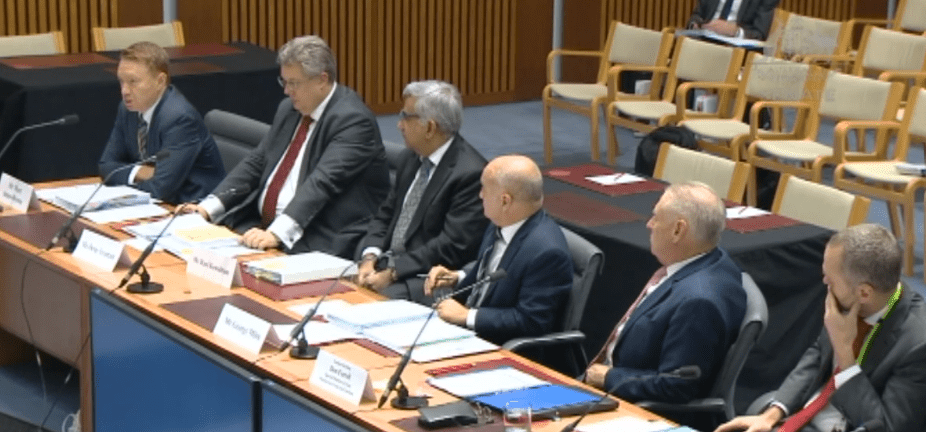
DFAT first assistant secretary Marc Innes-Brown (far left) answers questions during Senate Estimates on Tuesday.
GRAIN exports to Kuwait could be at risk following the Federal Government’s decision to phase out live sheep exports by 2028.
Kuwait is the largest importer of live sheep from Australia and buys about one million tonnes annually of grain, estimated at about $240 million, in the form of wheat and feed and malt barley.
The Department of Foreign Affairs and Trade confirmed that “a linkage” had been made by an unnamed Kuwaiti company between Australia’s grain exports and the phasing out of the live sheep trade.
DFAT first assistant secretary Marc Innes-Brown told Senate Estimates on Tuesday he was aware of comments by a Kuwaiti importer.
“I have heard of this before…but I don’t believe it has been a linkage that has been made in recent times including since the announcement,” Mr Innes-Brown said.
“My vague recollection is that the relevant private-sector importer may have made those comments previously.”
Nationals Senator for New South Wales Ross Cadell said he had conversations with the importer in the past two weeks around grain and live sheep exports.
“[I]t has been pointed out to us that Kuwait not only takes live sheep, but they take a million tonnes of grain,” Mr Cadell said during Senate Estimates.
Mr Innes-Brown said he wasn’t surprised that the comments had been made more recently.
He said it was well known that Kuwaiti businesses were “unhappy” about the phase-out.
“We’ve communicated with Kuwait and other partners over a period of time, very transparently.
“Frankly, I would characterise the responses we have got in terms of our discussions with trading partners around the most recent announcement as quite constructive.
“On the 30th of May, our ambassador spoke to the Assistant Foreign Minister for Kuwait, who said they accepted and respected the decision, and they want to look to move forward with the phase-out, and were keen to identify alternatives to keep the food-security partnership strong beyond the phase-out.”
Undue risk to trade relationship
Although small compared to Australia’s major markets like China, Indonesia and The Philippines, Kuwait is a significant destination for wheat and barley.
For the 12 months to September 2023, Kuwait imported about 420,000t of Australian wheat and 280,000t of feed barley.
This trade was down on the previous year, when Kuwait imported about 350,000t of wheat, 33,000t of malting barley and 479,000t of feed barley.
Mr Cadell said in a statement that Australia’s wider reputation as an agricultural commodity trading partner was at risk because of the live sheep export decision.
“For decades, Australia has been considered a reliable trading partner by both producers, and industry peak bodies.
“The decision to ban live sheep exports exposes Australian producers, including grain producers, to undue reputational risk in key markets such as the Middle East.
“Last year, Kuwait alone imported $240 million worth of Australian wheat and barley.
“These are markets that we can afford to risk.
“The last thing Australia should be doing is risking billions in trade just to satisfy the RSPCA.”
Trade talks positive
Minister for Trade and Tourism Don Farrell told Senate Estimates that the “diplomatic network” was focused on the “responses of states” rather than foreign exporters.
He also backed the work of Minister for Agriculture Murray Watt and said he was taking the policy and its effects on farmers “very seriously”.
In a separate Senate Estimates hearing, Mr Watt said he was in contact with representatives from the Kuwaiti government and the CEO of Al Mawashi, a major importer of live sheep.
“My primary dealings, in terms of Middle Eastern governments, have been with Kuwait, given they are the biggest market,” Mr Watt said.
“A few days after we made the announcement, I did a face-to-face briefing with a number of different ambassadors, or their representatives, from Middle Eastern embassies here in Canberra.”
Mr Watt said it wasn’t “any secret” that Kuwait and other live sheep importers would “prefer us to keep sending live exports to them”.
“They acknowledge that there is growing demand in their countries for processed sheepmeat, from Australia and from other places.
“I’ve obviously explained to them why we’re doing this — that this is a domestic issue; it’s no disrespect to them, and we remain very keen to work with them on their food-security challenges.
“I have to say that all of them were very keen to do so.”
The Federal Government and Department comments come over six months after Kuwaiti Commerce and Industry Minister Mohammad Othman Al Aiban reportedly wrote to Mr Watt urging him to continue the live sheep trade.
According to the Australian Financial Review, Mr Al Aiban wrote that the policy could threaten the wider trade relationship between both countries.
The pair reportedly had a virtual meeting about Australia filling the live export void with chilled meat, which Mr Al Aiban labelled unrealistic, and said the country was at capacity with chilled sheep meat.
In response, last month, Federal Member for O’Connor and Shadow Assistant Minister for Trade Rick Wilson hand-delivered a letter from WA farming leaders to Kuwaiti Undersecretary of the Minister of Commerce and Industry Ziad Abdullah Alnajem.
Mr Wilson said the letter from WAFarmers and Pastoralists & Graziers Association of WA stressed that the policy was driven by political expediency.
“As a lifelong wheat and sheep farmer before entering Federal Parliament a decade ago, I stand with WA’s live sheep exporters, and through them with the people of Kuwait who rely on the industry for food security,” Mr Wilson said.
“Kuwait is a very important trading partner for Australia, receiving more live sheep from us than any other nation, as well as sheep meat, barley, dairy, fruit and vegetables mostly produced by WA farmers.”

HAVE YOUR SAY